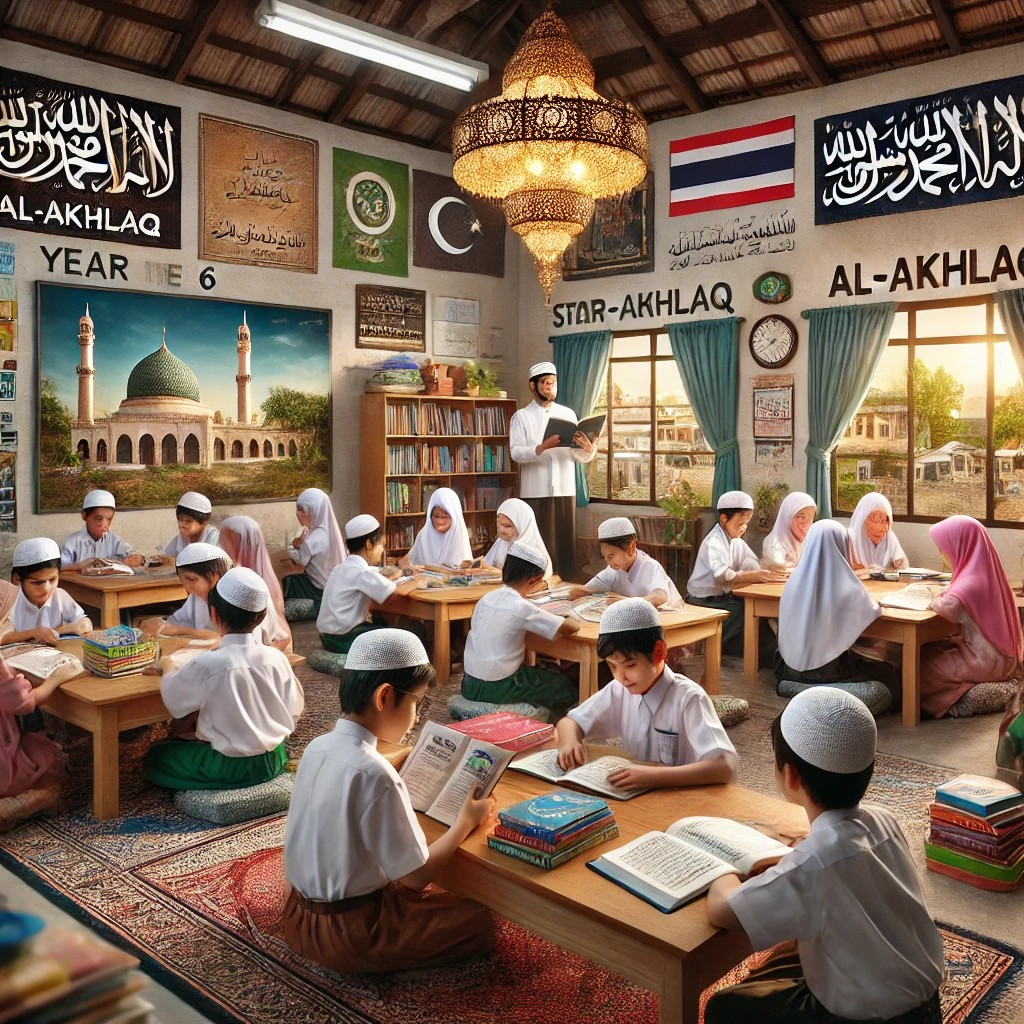The Development of Reading Comprehension Skill on Al-Akhlaq Subject Using the Story Line for Primary School Students, Year 6
DOI:
https://doi.org/10.14456/jois.2024.5Keywords:
Learning, Management, Reading, SkillAbstract
Objectives: 1) to find the efficiency of the learning management plans on reading comprehension using the Storyline, 2) to develop reading comprehension skills by using the Storyline, 3) to compare learning achievement between, before and after studying using the Storyline, 4) to study the students' satisfaction towards learning management using the Storyline.
Methodology: The sample group consisted of 23 primary school students of year 6/1 at Ban Sa-ae school by purposive sampling. Research technique instruments used were 1) learning management plans for developing reading comprehension skills on the al-Akhlaq subject using storyline, 2) al-Akhlaq reading comprehension test using Storyline, 3) learning achievement test between before and after learning on the al-Akhlaq subject using the Storyline and 4) students’ satisfaction questionnaire towards learning management by using Storyline.
Research findings: 1) the efficiency of the learning plans for reading comprehension using Storyline on al-Akhlaq subject at 83.15/85.22, which is higher than the standard criteria 70/70 as defined, 2) the results of developing reading comprehension skills by using the Storyline on al Akhlaq subject for primary school students of year 6, the value was higher than the criteria of 70 percent which is equal to 82.03, 3) the comparison result of learning achievement between before and after learning by using the Storyline on al-Akhlaq subject for primary school students, year 6, was (25.57 > 19.87) with a statistically significant difference of 0.05 and 4) the satisfaction of primary school students, year 6 towards the learning management by using the Storyline on al-Akhlaq subject in overall was at a high level 4. The satisfaction of primary school students, in year 6 towards learning management using the Storyline on al-Akhlaq subject for primary school students, year 6 in overall was at a high level.
Contribution: This research can be used for academic proposes in terms of developing a model for teaching and learning Islamic studies.
References
Anantaworasakul, A. (2002). gaan jàt gaan riian gaan sŏn dûuay wí-tee Storyline [Organizing teaching activities using the Storyline method]. Faculty of Education, Chulalongkorn University.
Chaikhamming, R. (2018). Development of reading comprehension ability of ninth-grade students, using story line learning [Unpublished master’s thesis]. Maha Sarakham Rajabhat University.
Khaemmanee, T. (2005). rôop bàep gaan riian gaan sŏn taang lêuuak têe làak lăai [Teaching format: Various options]. Chulalongkorn University Press.
Khammee, P. (2021). Development of reading comprehension Success Using Tale of Dhammapada Supported by Storyline teaching techniques for Mathayomsuksa 3 students [Unpublished master’s thesis]. Naresuan University.
Mathung, K. (2019). Developing reading comprehension abilities of Mathayom 1 students at Khun Krai Pittayakhom School by using reading comprehension exercises. (Research Report). Khun Krai Phitthayakhom School.
Ministry of Education. (2010). naew taang gaan jàt gìt-jà-gam pát-tá-naa pôo riian · dtaam làk sòot gaen glaang gaan sèuk-săa kân péun tăan · pút-tá-sàk-gà-ràat · sŏng-pan-hâa-rói-hâa-sìp-èt [Guidelines for organizing student development activities. According to the Basic Education Core Curriculum, B.E. 2007]. Bureau of Academic Affairs and Educational Standards.
Phetcharat, J., & Thongbai, A. (2013). gaan àan pêuua pát-tá-naa kun-ná-pâap chee-wít [Reading to improve quality of life]. Odeon store.

Downloads
Published
How to Cite
Issue
Section
License
Copyright (c) 2024 © The Author(s). Published by the Journal of Islamic Studies, Prince of Songkla University under the Creative Commons Attribution 4.0 International License.

This work is licensed under a Creative Commons Attribution 4.0 International License.
All articles Published in The Journal of Islamic Studies are author’s opinions, and not the responsibility of the Faculty of Islamic Sciences nor the editorial board. However any citation should be referred to the journal.



















